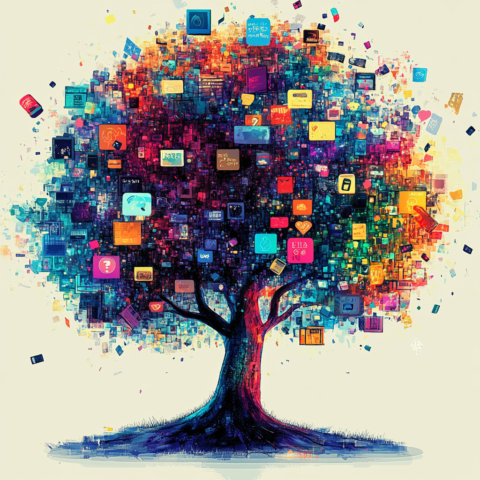Generation Z, born between the mid-1990s and early 2010s, has grown up in a world dominated by social media, smartphones, and instant communication. This digital native generation has developed its own unique vocabulary, often leaving older generations scratching their heads. Meanwhile, Generation Alpha (born from 2010 onwards) is already developing its own linguistic quirks. In this article, we’ll explore the most popular Gen Z slang terms, their meanings, origins, and how they compare to expressions used by Gen Alpha, Millennials, Gen X, and Boomers.
No Cap
Meaning: “No lie” or “for real”
Usage: Used to emphasize the truth of a statement
Example: “I got straight A’s this semester, no cap.”
Origin: The term “cap” has roots in African American Vernacular English (AAVE) dating back to the early 1900s, where it meant to lie or exaggerate. “No cap” is simply the negation of this, emphasizing honesty.
Generational Contrast:
Gen Alpha: “Fax” (short for “facts”)
Millennials: “For real”
Gen X: “Seriously”
Boomers: “Honestly”
Slay
Meaning: To do something exceptionally well or to look amazing
Usage: Used as a compliment or to express admiration
Example: “Your presentation was amazing! You totally slayed it!”
Origin: “Slay” originated in LGBTQ+ and drag culture, particularly ball culture in the 1970s and 1980s. It gained mainstream popularity through social media and shows like “RuPaul’s Drag Race.”
Generational Contrast:
Gen Alpha: “Ate” (as in “that performance ate”)
Millennials: “Killin’ it”
Gen X: “Nailed it”
Boomers: “Knocked it out of the park”
Tea
Meaning: Gossip or drama
Usage: Used when sharing or asking for juicy information
Example: “What’s the tea on Sarah and Tom’s breakup?”
Origin: “Tea” as slang for gossip originated in drag and black gay communities in the 1980s. It’s believed to come from the practice of women gathering to drink tea and gossip.
Generational Contrast:
Gen Alpha: “Spill”
Millennials: “Drama”
Gen X: “Dirt”
Boomers: “Scoop”
 Lit
Lit
Meaning: Exciting, amazing, or fun
Usage: Used to describe a particularly enjoyable situation or event
Example: “That party last night was lit!”
Origin: While “lit” has been used to mean “intoxicated” since the 1910s, its current usage as “exciting” or “excellent” gained popularity in the 2010s, particularly in hip-hop culture.
Generational Contrast:
Gen Alpha: “Fire” or “Flames”
Millennials: “Awesome”
Gen X: “Cool”
Boomers: “Groovy”
Yeet
Meaning: An exclamation of excitement or approval, often used when throwing something
Usage: Can be used as an exclamation or a verb
Example: “I finished my homework, yeet!” or “He yeeted the ball across the field.”
Origin: “Yeet” gained popularity in 2014 through a viral dance video on Vine. Its usage has since evolved beyond the dance to become a versatile exclamation.
Generational Contrast:
Gen Alpha: “Skibidi” (used similarly, but originated from a viral YouTube video)
Millennials: “Woo!”
Gen X: “Awesome!”
Boomers: “Far out!”
Flex
Meaning: To show off or boast
Usage: Can be used as a verb or noun
Example: “He’s always flexing his new car on Instagram.”
Origin: “Flex” comes from the idea of flexing one’s muscles to show off strength. It gained popularity in hip-hop culture before becoming mainstream slang.
Generational Contrast:
Gen Alpha: “Flex” (still used, but often ironically)
Millennials: “Humble brag”
Gen X: “Show off”
Boomers: “Hot dog”
Salty
Meaning: Angry, upset, or bitter, usually over something minor
Usage: Used to describe someone’s negative attitude
Example: “Don’t be salty just because you lost the game.”
Origin: “Salty” has been used to mean irritated or angry since the 1930s, but it gained renewed popularity with Gen Z through internet culture.
Generational Contrast:
Gen Alpha: “Pressed”
Millennials: “Butthurt”
Gen X: “Ticked off”
Boomers: “Sore”
Stan
Meaning: An overzealous or obsessive fan
Usage: Can be used as a noun or verb
Example: “I stan Billie Eilish, her music is amazing!”
Origin: “Stan” comes from the 2000 Eminem song of the same name, which depicted an obsessive fan. It entered mainstream usage in the late 2010s.
Generational Contrast:
Gen Alpha: “Simp” (has taken on a similar meaning for some)
Millennials: “Fangirl/Fanboy”
Gen X: “Groupie”
Boomers: “Teenybopper”
Vibe
Meaning: The mood or atmosphere of a person, place, or situation
Usage: Can be used as a noun or verb
Example: “This café has a great vibe.” or “I’m just vibing to this music.”
Origin: “Vibe” is short for “vibration” and has been used to describe mood or atmosphere since the 1960s, but it’s seen a resurgence with Gen Z.
Generational Contrast:
Gen Alpha: “Energy”
Millennials: “Mood”
Gen X: “Atmosphere”
Boomers: “Scene”
Finsta
Meaning: A secondary, more private Instagram account
Usage: Used as a noun
Example: “I only post my real thoughts on my finsta.”
Origin: “Finsta” is a portmanteau of “fake” and “Instagram,” although these accounts are often more authentic than a user’s main account.
Generational Contrast:
Gen Alpha: “Alt” (short for alternate account, used across various platforms)
Millennials: “Private account”
Gen X and Boomers: N/A (concept mostly unique to younger generations)
Bet
Meaning: “Okay” or “Sure”
Usage: Used as an affirmation or agreement
Example: “Want to grab lunch?” “Bet.”
Origin: “Bet” is likely a shortened version of “You bet” or “That’s a bet,” which have been used as affirmations for decades.
Generational Contrast:
Gen Alpha: “Bet” (still commonly used)
Millennials: “Cool”
Gen X: “Word”
Boomers: “Right on”
Lowkey
Meaning: Somewhat or secretly
Usage: Used to downplay or soften a statement
Example: “I’m lowkey obsessed with that new show.”
Origin: “Lowkey” has been used to mean “quiet” or “restrained” since the 1920s, but its usage as “somewhat” or “secretly” gained popularity in the 2010s.
Generational Contrast:
Gen Alpha: “Lowkey” (still used) or “Deadass” (for emphasis)
Millennials: “Kinda”
Gen X: “Sort of”
Boomers: “On the down low”
Shook
Meaning: Shocked or surprised
Usage: Used to express disbelief or strong emotion
Example: “That plot twist left me shook!”
Origin: “Shook” is derived from “shaken” and gained popularity through social media and meme culture in the mid-2010s.
Generational Contrast:
Gen Alpha: “Shooketh” (an intensified version of shook)
Millennials: “Mindblown”
Gen X: “Floored”
Boomers: “Flabbergasted”
Snack
Meaning: An attractive person
Usage: Used as a compliment
Example: “Your new haircut makes you look like a snack!”
Origin: “Snack” as a term for an attractive person emerged in the mid-2010s, possibly derived from the idea of someone looking good enough to eat.
Generational Contrast:
Gen Alpha: “Baddie” (regardless of gender)
Millennials: “Hot”
Gen X: “Foxy”
Boomers: “Dreamboat”
Sus
Meaning: Suspicious or questionable
Usage: Used to express doubt or suspicion
Example: “That guy’s story sounds kinda sus.”
Origin: “Sus” is short for “suspicious” and gained widespread popularity through the online game Among Us in 2020.
Generational Contrast:
Gen Alpha: “Sus” (still widely used)
Millennials: “Sketchy”
Gen X: “Fishy”
Boomers: “Shady”
Drip
Meaning: Style, especially in fashion
Usage: Used to describe someone’s fashionable appearance
Example: “Your outfit has some serious drip!”
Origin: “Drip” in this context originated in Atlanta’s hip-hop scene in the 2010s, referring to expensive or flashy jewelry and clothing.
Generational Contrast:
Gen Alpha: “Drippy” (an extension of drip)
Millennials: “Swag”
Gen X: “Fly”
Boomers: “Sharp”
 Hits Different
Hits Different
Meaning: Has a unique or special impact
Usage: Used to describe something that resonates in a particular way
Example: “This song hits different when you’re going through a breakup.”
Origin: This phrase gained popularity on social media platforms like Twitter and TikTok in the late 2010s.
Generational Contrast:
Gen Alpha: “Bussin'” (originally about food, now used more broadly)
Millennials: “Feels”
Gen X: “Strikes a chord”
Boomers: “Really speaks to you”
Simp
Meaning: Someone who is overly attentive or submissive, especially to someone they’re attracted to
Usage: Often used teasingly or critically
Example: “He’s such a simp, he always agrees with whatever she says.”
Origin: “Simp” is believed to be short for “simpleton,” but its current usage gained popularity on TikTok and Twitter in the late 2010s.
Generational Contrast:
Gen Alpha: “Simp” (but often used more positively)
Millennials: “White knight”
Gen X: “Pushover”
Boomers: “Sucker”
Cap
Meaning: A lie or to lie
Usage: Used to call out dishonesty
Example: “He said he got 100% on the test, but that’s cap.”
Origin: As mentioned earlier, “cap” has roots in AAVE dating back to the early 1900s.
Generational Contrast:
Gen Alpha: “Sus” (used interchangeably with cap in some contexts)
Millennials: “BS”
Gen X: “Bogus”
Boomers: “Bunk”
Periodt
Meaning: Used for emphasis, similar to “period” at the end of a sentence
Usage: Added to the end of a statement for emphasis
Example: “This is the best pizza in town, periodt.”
Origin: “Periodt” is an intentional misspelling of “period” that originated in AAVE and gained popularity through social media.
Generational Contrast:
Gen Alpha: “On God” (used for similar emphasis)
Millennials: “End of story”
Gen X: “Case closed”
Boomers: “And that’s that”
Origins of Generational Slang
Understanding the origins of slang for each generation provides valuable insight into the cultural, technological, and social influences that shaped their language. Let’s explore how the sources of slang have evolved across generations:
Baby Boomers (Born 1946-1964)
Boomer slang was heavily influenced by:
- The counterculture movement of the 1960s and 1970s
- Rock and roll music
- The Vietnam War and anti-war sentiment
- The civil rights movement
Examples of Boomer slang origins:
- “Groovy” – Derived from 1920s jazz culture, popularized in the 1960s psychedelic scene
- “Far out” – Originated in jazz and beatnik culture, adopted by hippies
- “Dig it” – From African American jazz culture, meaning to understand or appreciate
Generation X (Born 1965-1980)
Gen X slang drew inspiration from:
- Hip-hop and rap culture
- MTV and music videos
- Early computer and video game culture
- Skateboarding and extreme sports
Examples of Gen X slang origins:
- “Rad” – Short for “radical,” popularized by skateboarding and surfing culture
- “As if” – Popularized by the 1995 movie “Clueless”
- “Talk to the hand” – Originated in African American Vernacular English (AAVE), popularized by Martin Lawrence
Millennials (Born 1981-1996)
Millennial slang was influenced by:
- The rise of the internet and early social media
- Text messaging and instant messaging
- Reality TV
- Meme culture
Examples of Millennial slang origins:
- “LOL” – Originated in early internet chat rooms and instant messaging
- “On fleek” – Popularized on social media, particularly Vine and Instagram
- “Adulting” – Coined on Tumblr to describe the challenges of adult responsibilities
Generation Z (Born 1997-2012)
Gen Z slang draws heavily from:
- Social media platforms (especially TikTok, Instagram, and Twitter)
- Meme culture and viral content
- Gaming communities
- LGBTQ+ culture
- African American Vernacular English (AAVE)
Examples of Gen Z slang origins:
- “Yeet” – Originated from a 2014 viral dance video on Vine
- “Sus” – Popularized by the online game Among Us in 2020
- “No cap” – Derived from AAVE, gained widespread use through hip-hop and social media
Generation Alpha (Born 2013-present)
While Gen Alpha is still young, their slang is already being shaped by:
- TikTok and other short-form video platforms
- YouTube influencers and content creators
- Online gaming communities
- Increased awareness of social issues at a young age
Examples of emerging Gen Alpha slang origins:
- “Cheugy” – Coined by a Gen Z student but popularized on TikTok, often used by Gen Alpha
- “Skibidi” – Originated from a surreal YouTube music video and associated TikTok trend
- “Fanum tax” – Derived from Twitch streamer culture
Key Differences in Slang Origins Across Generations
- Technology’s Influence
- Boomers and Gen X: Slang spread primarily through in-person interactions, music, and television.
- Millennials: Began to see the influence of internet culture and texting on slang.
- Gen Z and Alpha: Slang is heavily influenced by social media platforms, online gaming, and viral content.
- Speed of Adoption and Evolution
- Boomers and Gen X: Slang terms often lasted for years or decades.
- Millennials: Saw an acceleration in the adoption and evolution of slang due to internet culture.
- Gen Z and Alpha: Slang terms can rise to popularity and fall out of use within months or even weeks due to the fast-paced nature of social media.
- Globalization of Slang
- Boomers and Gen X: Slang was often regional or country-specific.
- Millennials: Began to see more international slang adoption due to the internet.
- Gen Z and Alpha: Slang is increasingly global, with terms quickly spreading across countries and cultures through social media.
- Influence of Subcultures
- Boomers: Heavily influenced by counterculture movements.
- Gen X: Drew from various subcultures like hip-hop and skateboarding.
- Millennials: Influenced by internet subcultures and niche online communities.
- Gen Z and Alpha: Slang often originates from specific online communities (e.g., gaming, fandoms) before spreading more widely.
- Multicultural Influences
- Boomers and Gen X: Some adoption of slang from African American and Latino cultures, but often limited.
- Millennials: Increased adoption of multicultural slang due to greater cultural mixing online.
- Gen Z and Alpha: Heavy influence from AAVE and other multicultural sources, with a growing awareness of the origins and cultural significance of slang terms.
- Visual Components
- Boomers and Gen X: Slang was primarily verbal.
- Millennials: Began incorporating texting abbreviations and emoticons into slang.
- Gen Z and Alpha: Slang often includes visual components like memes, GIFs, and emojis, sometimes to the point where a single image can convey a complex slang phrase.
- Social Awareness
- Boomers and Gen X: Slang often reflected social movements but wasn’t always politically correct by today’s standards.
- Millennials: Began to see more socially conscious slang and the “cancellation” of problematic terms.
- Gen Z and Alpha: Slang often reflects heightened awareness of social issues, with terms related to identity, mental health, and social justice becoming common.
- Ironical Usage
- Boomers and Gen X: Slang was generally used sincerely.
- Millennials: Began to use some slang terms ironically.
- Gen Z and Alpha: Often use slang with multiple layers of irony, sometimes to the point where the original meaning is obscured.
The evolution of slang across generations reflects broader societal changes in technology, culture, and social awareness. While Boomer and Gen X slang was largely shaped by music, counterculture, and traditional media, Millennial slang marked the beginning of internet influence on language. Gen Z and Alpha slang represent a new frontier, where the lines between online and offline culture are increasingly blurred, and language evolves at an unprecedented pace.
Understanding these generational differences in slang can provide valuable insights into each cohort’s values, influences, and modes of communication. For marketers, educators, and anyone working across generational lines, recognizing these linguistic nuances can be key to effective communication and cultural understanding.
However, it’s important to note that while generational categorizations can be useful, they are not absolute. Individual experiences, regional differences, and personal preferences all play a role in language use. Moreover, in our interconnected world, slang terms often transcend generational boundaries, with older generations adopting newer slang and younger people reviving retro terms.
As we look to the future, it’s clear that the evolution of slang will continue to accelerate, driven by new technologies, social movements, and the ever-changing landscape of digital culture. By staying open-minded and curious about these linguistic trends, we can better understand and connect with people across all generations.



